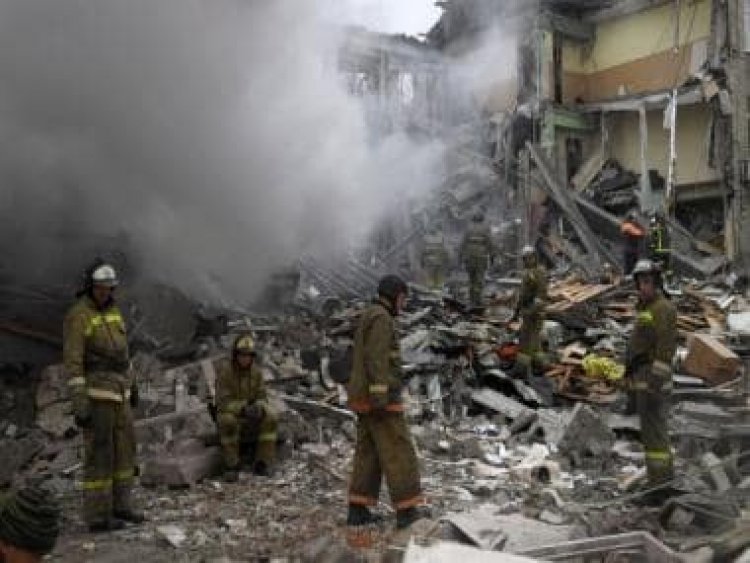Explained: The World Economic Forum has warned the world of a polycrisis in 2023. What is it?
Explained: The World Economic Forum has warned the world of a polycrisis in 2023. What is it?

Starting today (16 January) until Friday (20 January), 2,658 of the “world’s decision-makers” will gather in Davos, Switzerland for the annual meeting of the World Economic Forum. Ahead of this yearly meet, the World Economic Forum published the Global Risks Reports 2023 in which it warned that the world may see a ‘polycrisis’ centred around natural resource shortages by 2030.
But what does this phrase ‘polycrisis’ mean? Is this just a new label in the litany of doom and gloom? We take a closer look at the phrase and how it applies to the world as of today and how can we prepare ourselves for this phenomenon.
What is a polycrisis?
While the word polycrisis has been around for long, it has gained traction in the past year. Columbia University historian Adam Tooze is perhaps the most prominent champion of the polycrisis label.
His explanation of the term is: A problem becomes a crisis when it challenges our ability to cope and thus threatens our identity. In the polycrisis the shocks are disparate, but they interact so that the whole is even more overwhelming than the sum of the parts.
Another explanation of polycrisis would be — when multiple crises in multiple global systems become causally entangled in ways that significantly degrade humanity’s prospects. These interacting crises produce harms greater than the sum of those the crises would produce in isolation, were their host systems not so deeply interconnected.
If you are seeking for a simpler meaning of a polycrisis, it would be the ‘perfect storm’.
Also read: Will the Ukraine war end? Will there be a recession? Predictions for 2023
The term polycrisis was first used in the 1990s by French theorist of complexity Edgar Morin. In the 1999 book Homeland Earth: A Manifesto for a New Millennium, co-authored by Anne Brigitte Kern, Morin had written of “interwoven and overlapping crises” affecting humanity and argued that the most “vital” problem of the day was not any single threat but the “complex intersolidarity of problems, antagonisms, crises, uncontrollable processes, and the general crisis of the planet”— a phenomenon they labelled the polycrisis.
Adopting the concept from Morin and Kern in 2013, South African sociologist and sustainable-transition theorist Mark Swilling defined a polycrisis as “a nested set of globally interactive socio-economic, ecological and cultural– institutional crises that defy reduction to a single cause”.
One must note here that a polycrisis is different from ‘permacrisis’ — the Collins English Dictionary word for 2022. Permacrisis, as explained by the British dictionary is, “an extended period of instability and insecurity.”
What WEF report says on polycrisis?
The WEF report, released last Wednesday, said that the world is facing a set of risks that feel both wholly new and eerily familiar.
The report reads: “We have seen a return of “older” risks — inflation, cost-of-living crises, trade wars, capital outflows from emerging markets, widespread social unrest, geopolitical confrontation and the spectre of nuclear warfare. These are being amplified by comparatively new developments in the global risks landscape, including unsustainable levels of debt, a new era of low growth, low global investment and de-globalisation, a decline in human development, and the growing pressure of climate change. Together, these are converging to shape a unique, uncertain and turbulent decade to come.”
The report, produced in partnership with Marsh McLennan and Zurich Insurance Group, further goes on to state that these risks may converge into a polycrisis by the end of the decade. “These present and future risks can also interact with each other to form a ‘polycrisis’—a cluster of related global risks with compounding effects, such that the overall impact exceeds the sum of each part,” the report said.
The report elaborated that the current Ukraine war, now into Day 327, has plunged Europe into a major energy crisis and set inflation on an upward spiral, pushing up the cost of living and creating a food crisis that spreads far beyond Europe.

In such a situation, many governments have refocused their priorities towards short-term risks such as countering food shortages or energy shortfalls at the cost of ignoring climate change and global development when they are most needed.
As WEF’s managing director Saadia Zahidi wrote in a preface to the report, “The world’s collective focus is being channelled into the ‘survival’ of today’s crises. “Yet much-needed attention and resources are being diverted from newly emerging or rapidly accelerating risks.”
According to the WEF, the rising cost of living, slow economic growth, and tight global food and energy supplies rank as pressing short-term global risks. On the other hand, the long-term risks over the coming decade are failure to mitigate climate change, failure to adapt to climate change, extreme weather events, and the threat of biodiversity collapse.
What does the future hold?
However, the WEF report does offer some hope amid the doom and gloom. It states that there is a window to shape a more secure future.
It asks world leaders to address the issue of erosion of trust. “Addressing the erosion of trust in multilateral processes will enhance our collective ability to prevent and respond to emerging cross-border crises and strengthen the guardrails we have in place to address well-established risks,” said the report.
It further calls on leaders to act collectively, decisively and with a long-term lens to shape a pathway to a more positive, inclusive and stable world.
With inputs from agencies
Read all the Latest News, Trending News, Cricket News, Bollywood News,
India News and Entertainment News here. Follow us on Facebook, Twitter and Instagram.
What's Your Reaction?


























































